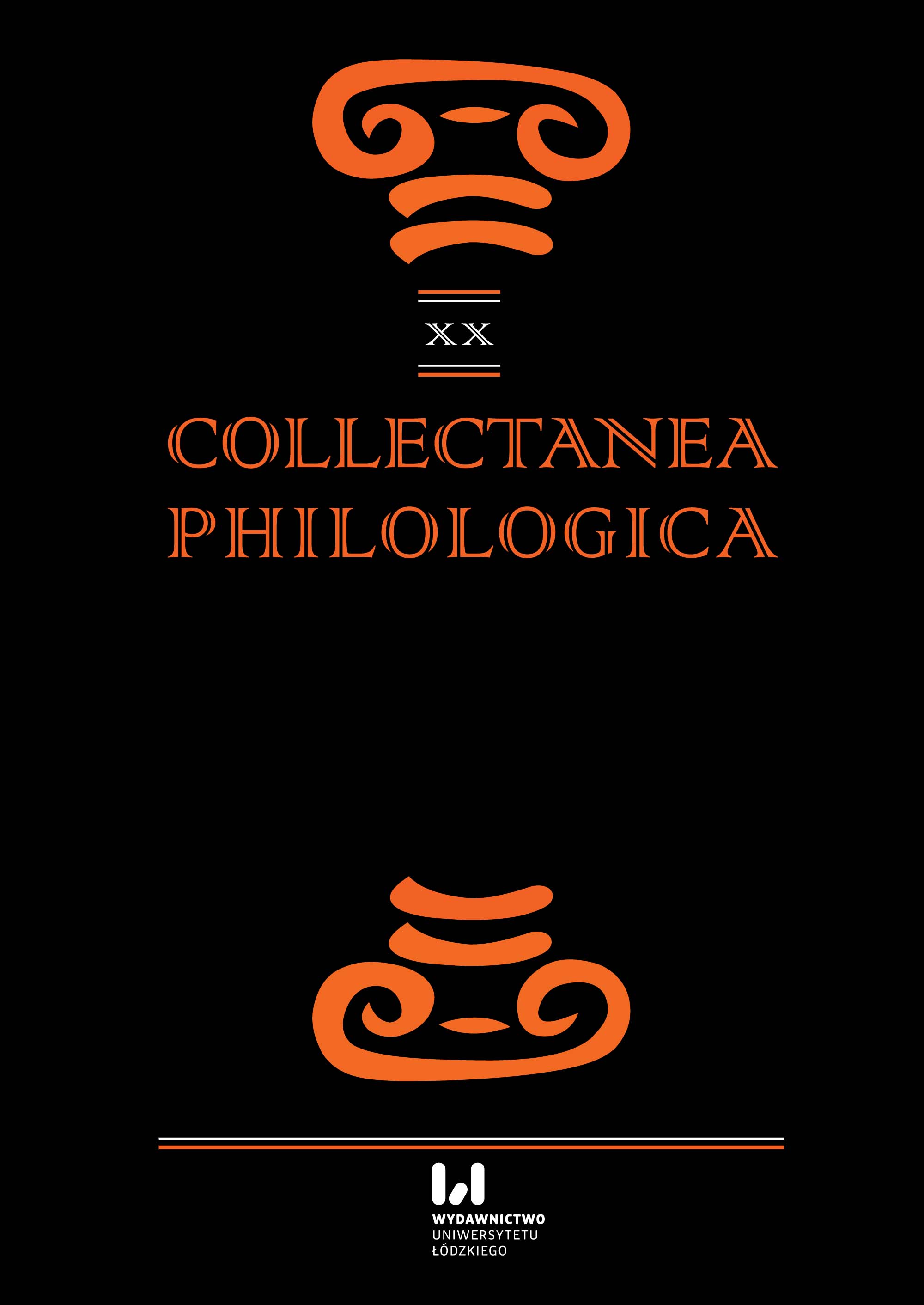Bóstwa i demony kobiece w tragedii greckiej
DOI:
https://doi.org/10.18778/1733-0319.20.01Słowa kluczowe:
Greek tragedy, female deities and demons, Athena, EryniesAbstrakt
-
Bibliografia
Aeschylus (1998). Aeschyli tragoediae cum incerti poetae Prometheo. M. L. West (ed.). Stutgardiae et Lipsiae: G. B. Teubneri.
Google Scholar
Ajschylos (2016). Tragedie. t. 2. Przeł. i oprac. R. R. Chodkowski. Lublin: Towarzystwo Naukowe KUL.
Google Scholar
Albini, U. (1983). „L’Ifigenia in Tauride e la fine del mito”. La Parola del Passato 38 (1983). 105–116.
Google Scholar
Albini, U. (2000). Euripide o dell’invenzione. Milano: Garzanti.
Google Scholar
Chodkowski, R. R. (1975). Funkcja obrazów scenicznych w tragediach Ajschylosa. Wrocław: Zakład Narodowy Imienia Ossolińskich Wydawnictwo PAN.
Google Scholar
Chodkowski, R. R. (1993). „Życie Ajschylosa. Wstęp – przekład – komentarz”. Roczniki Humanistyczne XLI/3. 57–67.
Google Scholar
Chodkowski, R. R. (2003). Teatr grecki. Lublin: Towarzystwo Naukowe KUL.
Google Scholar
Czerwińska, J. (2013). Innowacje mitologiczne i dramaturgiczne Eurypidesa. Tragedia. Tragikomedia. Łódź: Wydawnictwo Uniwersytetu Łódzkiego.
Google Scholar
Di Benedetto, V. (1978). L’ideologia del potere e la tragedia greca. Ricerche su Eschilo. Torino: Einaudi.
Google Scholar
Di Benedetto,V., Medda E. (1997). La tragedia sulla scena. La tragedia greca in quanto spettacolo teatrale. Torino: Einaudi.
Google Scholar
Dodds E. R. (2002). Grecy i irracjonalność. Przeł. J. Partyka. Bydgoszcz: Homini.
Google Scholar
Euripides (1937). Euripidis Fabulae. Vol. 2. G. Murray (ed.). Oxonii: Oxford University Press.
Google Scholar
Euripides (1947). Euripidis Fabulae. Vol. 1. G. Murray (ed.). Oxonii: Oxford University Press.
Google Scholar
Euripides (1978). Euripidis Fabulae. Vol. 3. G. Murray (ed.). Oxonii: Oxford University Press.
Google Scholar
Eurypides (1967). Tragedie. T. 1. Przeł. i oprac. J. Łanowski. Warszawa: PIW.
Google Scholar
Eurypides (1972). Tragedie. T. 2. Przeł. i oprac. J. Łanowski. Warszawa: PIW.
Google Scholar
Eurypides (1980). Tragedie. T. 3. Przeł. i oprac. J. Łanowski. Warszawa: PIW.
Google Scholar
Fösel, K. R. (1975). Der Deus ex machina in der Komödie. Erlangen: Palm & Enke.
Google Scholar
Guardini M. L. (1987). Il mito di Elena. Testi di Euripide e Isocrate. Treviso: Edizioni Canova Treviso.
Google Scholar
Hesiod (1930). Theogonia. F. Jacoby (ed.). Berlin: Weidmann.
Google Scholar
Hezjod. (1999). Narodziny bogów (Theogonia). Prace i dni. Tarcza. Przeł. J. Łanowski. Warszawa: Prószyński i S-ka.
Google Scholar
Homer (1999). Iliada. Przeł. K. Jeżewska, opr. J. Łanowski. Warszawa: Prószyński i S-ka.
Google Scholar
Homerus (1920). Homeri Opera in five volumes. D. B. Monro, Th. W. Allen (eds.). Oxford: Oxford University Press.
Google Scholar
Kitto, H. D. F. (1997). Tragedia grecka. Studium literackie. Przeł. J. Margański. Bydgoszcz: Homini.
Google Scholar
Lesky, A. (2006). Tragedia grecka. Przeł. M. Weiner. Kraków: Homini.
Google Scholar
Mastronarde, D. (1990). „Actors on High: The Skene roof, the Crane and the Gods in Attic Drama”. Classical Antiquity 9. 247–294.
Google Scholar
Nicolai, W. (1990). Euripides‘ Dramen mit rettendem Deus ex machina. Heidelberg: Universitätsverlag Carl Winter.
Google Scholar
Schmidt, W. (1963). Der Deus ex machina bei Euripides. Tübingen: Diss.
Google Scholar
Scholia (1976–1982). Scholia graeca in Aeschylum quae extant omnia. vol. I–II.O. Langwitz Smith (ed.). Lipsiae: B.G. Teubner.
Google Scholar
Spira, A. (1960). Untersuchungen zum Deus ex machina bei Sophokles und Euripides. Kallmünz: Verlag Michael Lassleben.
Google Scholar
Stumpo, B. (1928). Il deus ex machina nella tragedia greca. Palermo: Sandron.
Google Scholar
Suidae lexicon (1971). A. Adler (ed.). Vol. I–IV. Leipzig: B. G. Teubner.
Google Scholar
Taplin, O. (2004). Tragedia grecka w działaniu. Przeł. A. Wojtasik. Kraków: Homini.
Google Scholar
Toutain, J. (1936). L’évolution de la conceptiondes Erinyes dans le mythe d’Oreste d’Eschyle à Euripide. Brussels: Mélanges F. Cumont.
Google Scholar
Whitman, C. H. (1974). Euripides and the Full Circle of Myth. Cambridge: Loeb Classical Monographs.
Google Scholar












